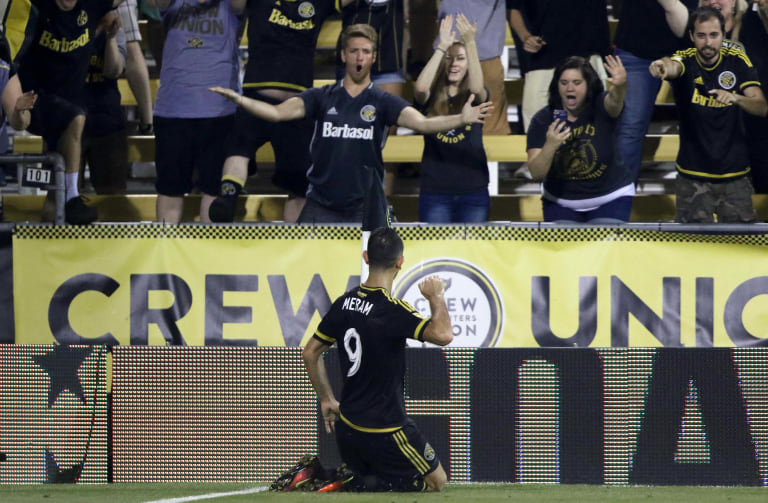Sometimes the shadows cover the burned areas on the grass on the other side.
Six months after moving from Columbus Crew SC to Orlando City SC, Justin Meram has returned to Ohio. Crew SC will send $750,000 in Targeted Allocation Money to Orlando (along with an international roster spot), around 40 percent less than they originally made on the deal.
Meram never took off with the Lions. He struggled on the field and it led to struggles off the field, or vice versa. He told ProSoccerUSA, “This has probably been the hardest four months, maybe, of my life, my career.” Now he’s returning to the club where he had seven years of success and adoration.
I’ve been through a similar scenario, so I can relate to Meram’s experience. I had the best season of my career with a team in Sweden and my contract ran out at the end of the year. Instead of returning to the team, I decided to go somewhere new – to try something new. It wasn’t as much about soccer as it was about life. I had experienced life in a certain way and wanted to experience something different.
I told my friends and former teammates the same thing Meram wrote on an Instagram post after originally getting traded from Columbus, “Time for me to be fearless and move on to the next chapter of my life with new challenges.”
But they are called challenges for a reason. They aren’t easy; they don’t always go as planned. If they did, well, you know the saying. For Meram – and myself in Sweden – they didn’t go as we had envisioned. I, too, had the worst six months of my life and asked to leave the new team.
I felt like a totally different person and player on the new team. I was the same person and player, of course, but everything around me was different so it brought out different parts of me. Everything in a person’s life relates back to actions on the field. The way a player performs is minutely integrated into how the person feels. The muscle memory required to whip a shot to the far corner starts in the brain; the soccer compartment of the brain doesn’t have a steel wall separating it from the life part of the brain.
The commute to the stadium in the morning. The way the person at the front desk says “Hello” when you walk through the day. The way teammates greet each other in the locker room. The type of warmup a coach runs. The type of instruction the coach gives. They all add up to influence a person’s general outlook; they all impact the brain’s wiring. The player we see in a certain life situation isn’t necessarily the player we will see in different life situations.
Sometimes the transition to new situations can be easy. We’ve all see players flawlessly move to new clubs, new countries, new continents. Miguel Almiron moved to Atlanta just fine. When I went to Sweden originally, I lived with another American and we felt like best friends within a week and I felt right at home. But we’ve also seen countless times when it didn’t work out.

Meram celebrating one of his 40 career goals for Crew SC | USA Today Sports Images
And if you think it says something about the player, how the inability to adapt says something about mental toughness, you either haven’t tried enough new things in life or you are scared to look in the mirror. Sometimes things just don’t go right. And most of the time it’s impossible to identify the precise point that made it go wrong.
The most important thing for a player – or probably any person who’s experienced something similar in work or relationships or travel – is to realize it can happen to anyone. The perception of a failure can leave scarring. It can implant a heavy seed in your brain, and it can be tough to move with the added weight. We are never the same people after. It’s vital to acknowledge that it’s a blemish, not an identity marker. Your career can still succeed.
Kevin de Bruyne might be the best example in world soccer. De Bruyne transferred from Genk to Chelsea and rarely got on the field for Jose Mourinho’s team; the Belgian moved backward to Wolfsburg only to return to the Premier League with Manchester City and become one of the best midfielders in the world.
People around the world barely remember he didn’t cut it at Chelsea, or at least they find it to be an indictment on the club rather than the player. It’s not the exact same path as Meram, but it shows anyone can struggle and it’s possible to recover from it.
Justin Meram was one of the best wingers in the league when he played in Columbus; he was a vital component in their run to the 2015 MLS Cup final. If he sheds the weight of his Orlando stint, he certainly has the ability to help Crew SC get back there in 2018.













